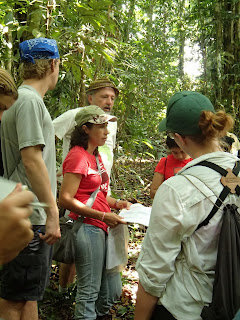“Be strong, and let
your heart take courage, all who wait for the LORD.”
~Psalm
31:24
I have just returned to Monteverde after an awesome two and
a half week field trip exploring Costa Rica and Panama. Over the next month I hope to blog
about where we went and what we saw, however it may take awhile to finish up
with everything in between school and Spanish and my independent research
project.
Two more of my “Humans Days” have focused on livestock and
deforestation. For the
livestock day, we explored the dairy industry in Monteverde. One day we went on a tour of both a
local, individually owned farm that produced cheese, and the cheese factory in
Monteverde that was established by the Quakers.
At the local farm we talked to the farmer (Jesus) and
learned how he makes cheese. He
has owned the farm for 28 years, and he used to sell the milk produced by his
cows to the Monteverde Cheese Factory, but now he keeps it and makes his own
cheese. He has 8 cows that produce
15 liters of milk each per day. So
naturally we had to first milk the cows.
He usually makes about 10 kg of cheese per day, which requires 84 liters of milk. The milk is pasteurized and cultured, then the curds are pressed to form fresh cheese. He is able to sell 5 kg of cheese for about $20, and works independently.
 |
| Cheese press |
The whey byproduct of the cheese production is fed to the pigs, which are raised to sell and also for Christmas dinner. The pig waste is utilized in a biodigester and the gas produced is used to boil the milk to make the cheese. Pretty cool cycle right? Here are some other cute pictures.
Things worked in much the same way in the Monteverde Cheese Factory, but on a much larger scale. There 40,000 L of milk are processed daily from about 40 different farmers. The farmers are guaranteed prices for premium milk that meets certain temperature, protein, and bacterial counts. Again the milk is pasteurized and mixed with culture and rennet to form curds.
The type of cheese produced is dependent on the type of bacteria culture used. The curds are pressed and often aged to give the cheese more flavor.
The whey again is fed to hogs (2000 of them). The waste produced from the hogs however is not used in a biodigester, but is feed to steers (this cycle is not as pretty…) The wastewater is treated in lagoons and eventually flows back into a river after it has been treated.
On the field trip, we learned
about Reduced Impact Logging (RIL) and tree plantations as two methods that
attempt to reduce the stresses of deforestation of tropical rainforests. RIL attempts to remove trees in a
sustainable manner, and avoids clear cutting, as is often the method for timber
extraction. RIL requires that
certain canopy cover percentages are maintained, only common trees are removed
of certain diameters, and the extraction method is done in a way to minimize
damage of surrounding areas. This
is often easier said than done, and requires quite a bit of oversight and
certifications and the work of a forestry engineer, however it is often a
decent income supplication for people in areas that qualify.
 |
| Talking with a forestry engineer about RIL |
Tree plantations were first started in the 1980s, to incentivize reforestation with commercial interest (though I would not use the term ‘reforestation’ if your intention is to cut it down with in 20 or 30 years). Anyway, it is an alternative method to timber production than clear cutting rainforests, and I suppose anything is better than that.
We have one more humans day
left. Hopefully in the next few
weeks more posts will come containing adventures from the rainforest! Tomorrow I begin my home-stay period
and I pray I have picked up enough Spanish to get by!







No comments:
Post a Comment